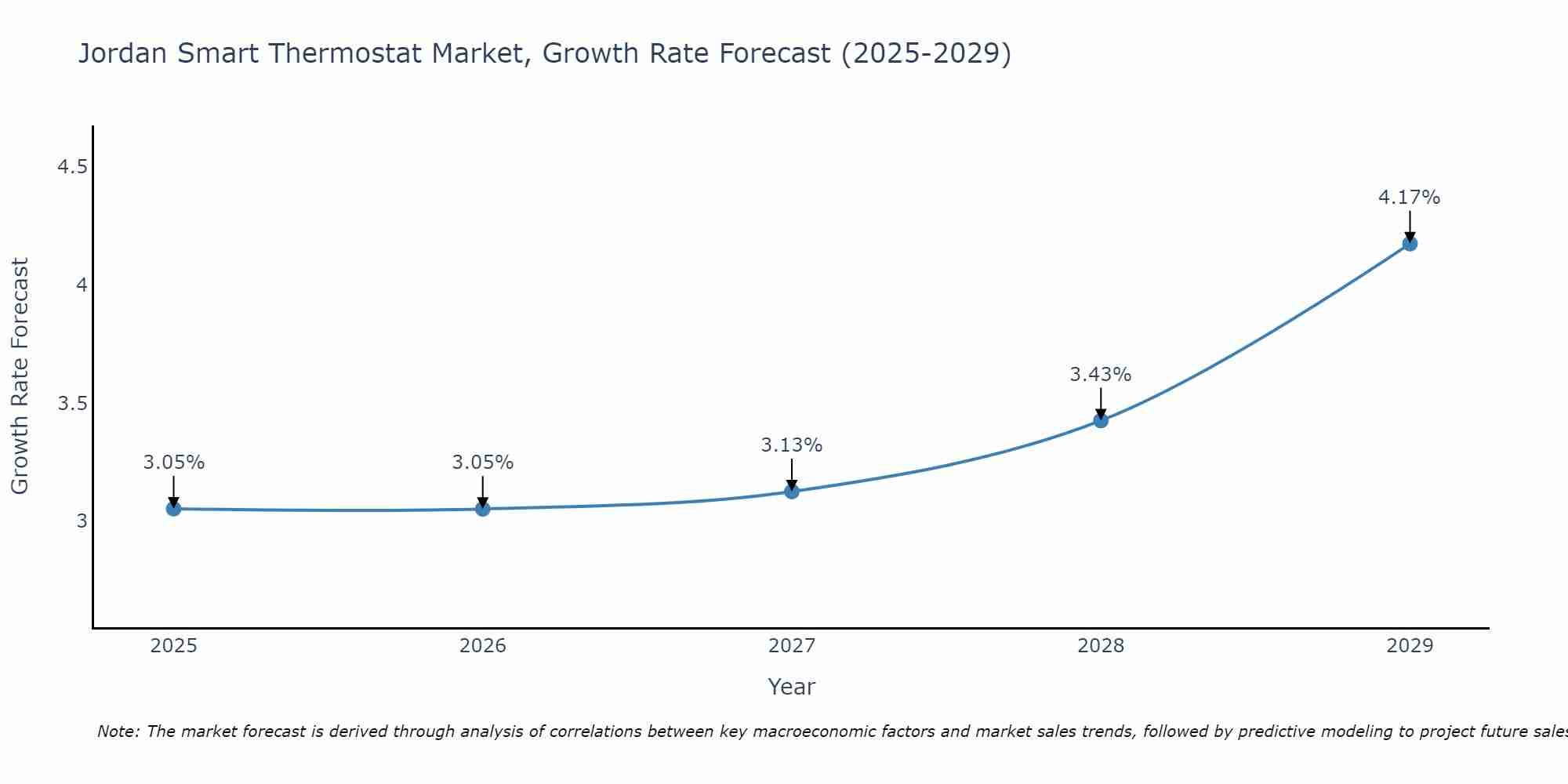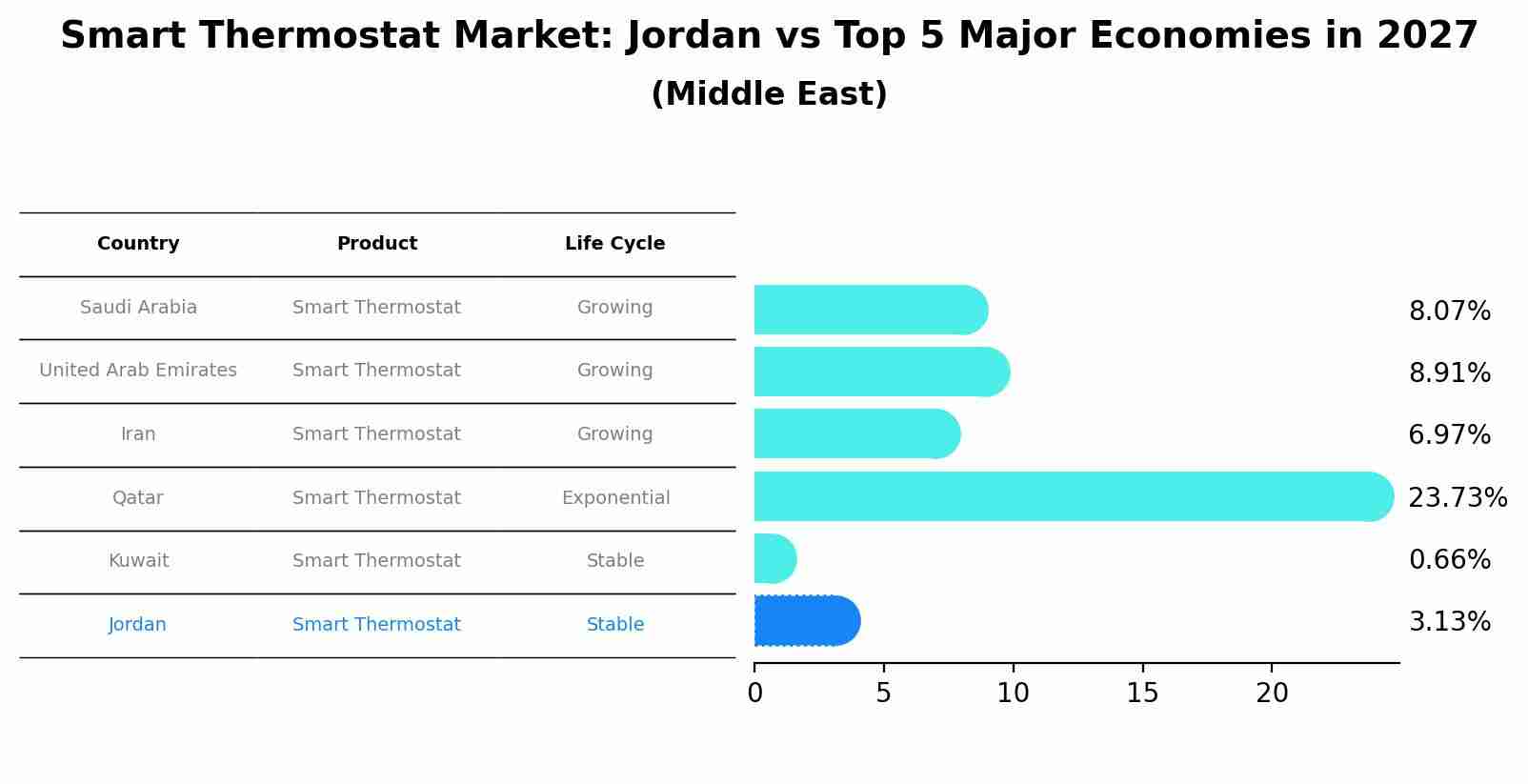Jordan Smart Thermostat Market Outlook | Forecast, Analysis, Size, COVID-19 IMPACT, Trends, Growth, Companies, Value, Revenue, Industry & Share
| Product Code: ETC369526 | Publication Date: Aug 2022 | Updated Date: Jul 2025 | Product Type: Market Research Report | |
| Publisher: 6Wresearch | Author: Sachin Kumar Rai | No. of Pages: 75 | No. of Figures: 35 | No. of Tables: 20 |
Jordan Smart Thermostat Market Size Growth Rate
The Jordan Smart Thermostat Market is projected to witness mixed growth rate patterns during 2025 to 2029. Commencing at 3.05% in 2025, growth builds up to 4.17% by 2029.

Smart Thermostat Market: Jordan vs Top 5 Major Economies in 2027 (Middle East)
Jordan's Smart Thermostat market is anticipated to experience a stable growth rate of 3.13% by 2027, reflecting trends observed in the largest economy Saudi Arabia, followed by United Arab Emirates, Iran, Qatar and Kuwait.

Jordan Smart Thermostat Market Synopsis
The Jordan Smart Thermostat Market is experiencing steady growth driven by the increasing adoption of smart home technologies in the country. Consumers are increasingly looking for energy-efficient solutions to control their home heating and cooling systems, leading to a rising demand for smart thermostats. Major players in the market are introducing advanced features such as remote access, energy usage tracking, and integration with smart home ecosystems to cater to the evolving needs of consumers. Additionally, government initiatives promoting energy efficiency and sustainability are further fueling the market growth. The market is competitive, with both local and international players vying for market share through product innovation and strategic partnerships. Overall, the Jordan Smart Thermostat Market is poised for continued expansion as smart home technology becomes more mainstream in the country.
Jordan Smart Thermostat Market Trends
The Jordan Smart Thermostat Market is experiencing a growing trend towards energy efficiency and smart home integration. Consumers are increasingly interested in smart thermostats that offer energy-saving features, remote access, and compatibility with voice assistants like Alexa and Google Assistant. With a focus on sustainability and cost savings, homeowners in Jordan are adopting smart thermostats to better control their home`s heating and cooling systems. The market is also witnessing a rise in innovative features such as learning algorithms that adapt to users` preferences and occupancy sensors that optimize energy usage. As smart home technology continues to evolve, the demand for advanced and connected thermostats in Jordan is expected to increase further, driving the market towards more intelligent and efficient solutions.
Jordan Smart Thermostat Market Challenges
In the Jordan Smart Thermostat Market, one of the main challenges faced is the relatively low awareness and adoption of smart home technologies among consumers. Many households in Jordan may not be familiar with the benefits and functionalities of smart thermostats, leading to a slower uptake of these products. Additionally, the higher initial cost of smart thermostats compared to traditional thermostats can be a barrier for price-sensitive consumers. Furthermore, the lack of standardized regulations and guidelines for smart home devices in Jordan can create uncertainty around the compatibility and security of these products, further hindering their widespread adoption. Educating consumers, addressing pricing concerns, and establishing clear industry standards are crucial steps to overcome these challenges and drive growth in the Jordan Smart Thermostat Market.
Jordan Smart Thermostat Market Investment Opportunities
The Jordan Smart Thermostat Market presents promising investment opportunities due to the increasing adoption of smart home technology in the country. With a growing awareness of energy efficiency and environmental sustainability, consumers are increasingly seeking smart solutions to monitor and control their home heating and cooling systems. Investing in companies that offer innovative smart thermostat solutions tailored to the Jordanian market can be lucrative. Additionally, partnerships with local utility companies to promote energy-saving initiatives and incentives for smart thermostat installations can further drive market growth. As the market continues to evolve and mature, investing in research and development for advanced features such as AI integration, remote access, and data analytics can position companies for long-term success in the Jordan Smart Thermostat Market.
Jordan Agar Market Government Policies
The Jordanian government has implemented various policies to promote energy efficiency and sustainability in the country, which directly impact the Smart Thermostat Market. Initiatives such as the National Energy Efficiency Action Plan aim to reduce energy consumption and greenhouse gas emissions by encouraging the adoption of smart technologies like smart thermostats. Additionally, the government offers incentives and subsidies to households and businesses investing in energy-efficient devices, including smart thermostats, to drive market growth. Regulatory frameworks such as building codes and standards also play a crucial role in promoting the integration of smart thermostats in new constructions and renovations. Overall, the government`s supportive policies create a favorable environment for the growth and adoption of smart thermostats in Jordan.
Jordan Smart Thermostat Market Future Outlook
The future outlook for the Jordan Smart Thermostat Market appears promising, with increasing adoption of smart home technology and growing awareness of energy efficiency. Consumers are becoming more inclined to invest in smart devices that offer convenience and cost savings. The government`s focus on promoting sustainable living and reducing energy consumption is expected to drive the demand for smart thermostats in Jordan. Additionally, advancements in technology such as AI integration and connectivity with other smart devices are likely to further propel the market growth. As more players enter the market and competition intensifies, we can expect to see innovative features and competitive pricing strategies, making smart thermostats more accessible to a wider range of consumers in Jordan.
Key Highlights of the Report:
- Jordan Smart Thermostat Market Outlook
- Market Size of Jordan Smart Thermostat Market, 2021
- Forecast of Jordan Smart Thermostat Market, 2031
- Historical Data and Forecast of Jordan Smart Thermostat Revenues & Volume for the Period 2018 - 2031
- Jordan Smart Thermostat Market Trend Evolution
- Jordan Smart Thermostat Market Drivers and Challenges
- Jordan Smart Thermostat Price Trends
- Jordan Smart Thermostat Porter's Five Forces
- Jordan Smart Thermostat Industry Life Cycle
- Historical Data and Forecast of Jordan Smart Thermostat Market Revenues & Volume By Type for the Period 2018 - 2031
- Historical Data and Forecast of Jordan Smart Thermostat Market Revenues & Volume By Wireless for the Period 2018 - 2031
- Historical Data and Forecast of Jordan Smart Thermostat Market Revenues & Volume By Wireless for the Period 2018 - 2031
- Historical Data and Forecast of Jordan Smart Thermostat Market Revenues & Volume By End-User Vertical for the Period 2018 - 2031
- Historical Data and Forecast of Jordan Smart Thermostat Market Revenues & Volume By Residential for the Period 2018 - 2031
- Historical Data and Forecast of Jordan Smart Thermostat Market Revenues & Volume By Commercial for the Period 2018 - 2031
- Jordan Smart Thermostat Import Export Trade Statistics
- Market Opportunity Assessment By Type
- Market Opportunity Assessment By End-User Vertical
- Jordan Smart Thermostat Top Companies Market Share
- Jordan Smart Thermostat Competitive Benchmarking By Technical and Operational Parameters
- Jordan Smart Thermostat Company Profiles
- Jordan Smart Thermostat Key Strategic Recommendations
Frequently Asked Questions About the Market Study (FAQs):
- Single User License$ 1,995
- Department License$ 2,400
- Site License$ 3,120
- Global License$ 3,795
Search
Thought Leadership and Analyst Meet
Our Clients
Related Reports
- Canada Oil and Gas Market (2026-2032) | Share, Segmentation, Value, Industry, Trends, Forecast, Analysis, Size & Revenue, Growth, Competitive Landscape, Outlook, Companies
- Germany Breakfast Food Market (2026-2032) | Industry, Share, Growth, Size, Companies, Value, Analysis, Revenue, Trends, Forecast & Outlook
- Australia Briquette Market (2025-2031) | Growth, Size, Revenue, Forecast, Analysis, Trends, Value, Share, Industry & Companies
- Vietnam System Integrator Market (2025-2031) | Size, Companies, Analysis, Industry, Value, Forecast, Growth, Trends, Revenue & Share
- ASEAN and Thailand Brain Health Supplements Market (2025-2031) | Strategy, Consumer Insights, Analysis, Investment Trends, Opportunities, Growth, Size, Share, Industry, Revenue, Segments, Value, Segmentation, Supply, Forecast, Restraints, Outlook, Competition, Drivers, Trends, Demand, Pricing Analysis, Competitive, Strategic Insights, Companies, Challenges
- ASEAN Bearings Market (2025-2031) | Strategy, Consumer Insights, Analysis, Investment Trends, Opportunities, Growth, Size, Share, Industry, Revenue, Segments, Value, Segmentation, Supply, Forecast, Restraints, Outlook, Competition, Drivers, Trends, Demand, Pricing Analysis, Competitive, Strategic Insights, Companies, Challenges
- Europe Flooring Market (2025-2031) | Outlook, Share, Industry, Trends, Forecast, Companies, Revenue, Size, Analysis, Growth & Value
- Saudi Arabia Manlift Market (2025-2031) | Outlook, Size, Growth, Trends, Companies, Industry, Revenue, Value, Share, Forecast & Analysis
- Uganda Excavator, Crane, and Wheel Loaders Market (2025-2031) | Strategy, Consumer Insights, Analysis, Investment Trends, Opportunities, Growth, Size, Share, Industry, Revenue, Segments, Value, Segmentation, Supply, Forecast, Restraints, Outlook, Competition, Drivers, Trends, Demand, Pricing Analysis, Competitive, Strategic Insights, Companies, Challenges
- Rwanda Excavator, Crane, and Wheel Loaders Market (2025-2031) | Strategy, Consumer Insights, Analysis, Investment Trends, Opportunities, Growth, Size, Share, Industry, Revenue, Segments, Value, Segmentation, Supply, Forecast, Restraints, Outlook, Competition, Drivers, Trends, Demand, Pricing Analysis, Competitive, Strategic Insights, Companies, Challenges
Industry Events and Analyst Meet
Whitepaper
- Middle East & Africa Commercial Security Market Click here to view more.
- Middle East & Africa Fire Safety Systems & Equipment Market Click here to view more.
- GCC Drone Market Click here to view more.
- Middle East Lighting Fixture Market Click here to view more.
- GCC Physical & Perimeter Security Market Click here to view more.
6WResearch In News
- Doha a strategic location for EV manufacturing hub: IPA Qatar
- Demand for luxury TVs surging in the GCC, says Samsung
- Empowering Growth: The Thriving Journey of Bangladesh’s Cable Industry
- Demand for luxury TVs surging in the GCC, says Samsung
- Video call with a traditional healer? Once unthinkable, it’s now common in South Africa
- Intelligent Buildings To Smooth GCC’s Path To Net Zero


















